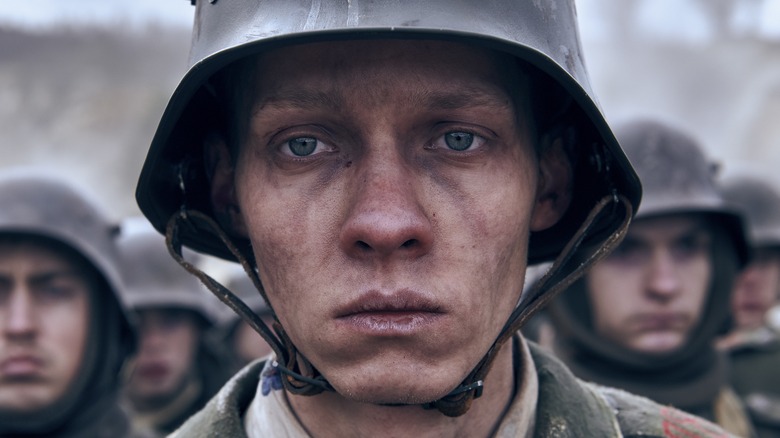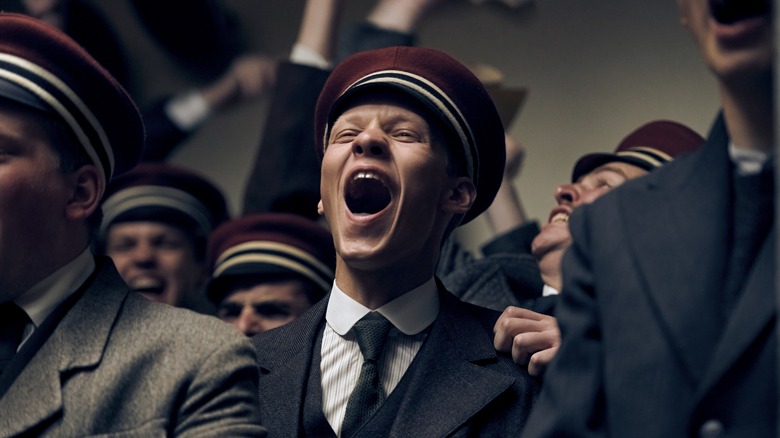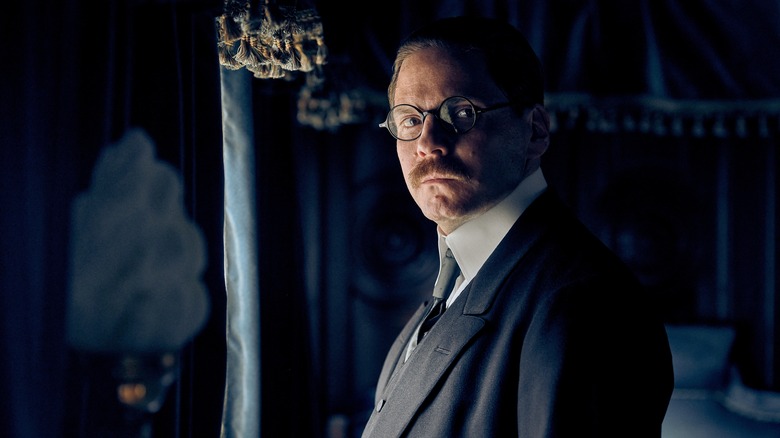All Quiet On The Western Front Review: The Brutal Front Is Far From Quiet
- Powerful lead performance from Felix Kammerer
- Anxiety-inducing score
- Captivating visuals
- Subplot of peace negotiations saps film of momentum
If there's one question we have going into the new Netflix adaptation of "All Quiet on the Western Front," it's a simple one: Is there really a point to telling a new version of this story? The classic German novel by Erich Maria Remarque was first translated to the big screen in 1930, just a handful of years after the end of World War I itself, and became a benchmark piece of anti-war art almost immediately. In some ways, every combat film that shows the horrors of war rather than just John Wayne triumphantly storming the beaches of a far-flung land is paying homage to "All Quiet on the Western Front."
Will a new adaptation of the source material offer up anything new to the genre, or will be simply be a rehash of something like "1917," just from the perspective of the young German soldier? But despite these reservations, "All Quiet on the Western Front," which premiered at the Toronto International Film Festival, manages to carve out a unique place for itself, capturing the inherent absurdity and pointlessness of war with a relentless brutality that is always powerful but occasionally difficult to watch.
Disillusionment about the glory of war
Paul Bäumer (Felix Kammerer) is a high school student in Germany when war breaks out in Europe. He, along with his fellow classmates, are champing at the bit, eager to report for duty and be shipped off to glorious war. They pick up their new uniforms, so proud and excited that they barely register that these are hand-me-downs from the boys who went before them — a name stitched into a collar here, an errant bullet hole remnant there. But whatever illusions they have as they march off to the front, they quickly abandon, as they are faced with the reality of what life in the trenches actually looks like. What follows is a horrific exploration of war, not just the actual combat sequences, but the long stretches of boredom, fatigue, depravation, and cruelty they experience even when not actually fighting for their lives on the field of battle. For young Paul, it is a brutal awakening — contrary to what he'd always been taught, there is no glory in this version of war.
It's a shame that so much of its audience will ultimately watch "All Quiet on the Western Front" streaming: It's a film that really deserves to be seen on a huge screen, with booming surround sound. The tension-filled score from Volker Bertelmann lends a sense of foreboding to every scene, keeping the audience rapt in anticipation of the next horror to unfold. As a whole, it's an all-out assault on the senses, one that pushes us to the edge but never becomes too much to handle. Felix Kammerer's performance in the lead role is captivating but appropriately anonymous — he has an everyman quality that draws the audience in but also underscores how common his plight was as a soldier during the First World War. It's an impressive debut performance, especially since the entire film is built around him. He is surrounded by an ensemble cast of characters who don't get a lot of screen time but are all able to leave an impression on audiences nonetheless.
Time away from the front
The film's narrative thrust is undermined by one choice that diverts from the original novel — it offers us the perspective from representatives of the German high command, responsible for negotiating a ceasefire with the Allied forces. They are caught between the pride of the German leadership, who are reluctant to offer an unconditional surrender even when they know they are beaten, and the recalcitrant French officials, who will accept nothing less. These characters, led by Daniel Brühl as the key official who understands that a quick end to the war is essential, are interesting enough, but they expand the world of the film unnecessarily.
We should spend every second of "All Quiet on the Western Front" with Paul, trapped in the never-ending meat grinder of war right alongside him. In the original book, even in the scenes where Paul is on a brief reprieve from war, the story follows him home to Germany, where his profound disillusionment crashes against the overwhelming optimism of civilians, who seem to be operating in some sort of propaganda-driven fantasy world. These scenes serve a narrative purpose, but it's difficult to tell what is gained by featuring brief, surface-level insights into the negotiation process that would ultimately lead to the ill-fated Treaty of Versailles. Perhaps they operate as a release valve for the pressure that permeates the film, but it's that's the case, it's misguided — the violence is inescapable for Paul, and it should be so for us as well.
These are minor qualms, though, for an adaptation of a beloved novel that has since become the model by which all anti-war films are built. This version of "All Quiet on the Western Front" not only manages to justify its own existence, it finds new ways to explore the horrors of combat. It uses sound and visuals to create a non-stop sensory overload that makes us feel almost as though we're witnessing Paul go through an actual nightmare. Although it's easy to think that there are no new stories to tell about World War I, and it seems as though we've seen it all before, the despair and disillusionment on display in "All Quiet on the Western Front" feels somehow heartbreakingly fresh.
"All Quiet on the Western Front" will arrive on Netflix on Friday, October 28.


